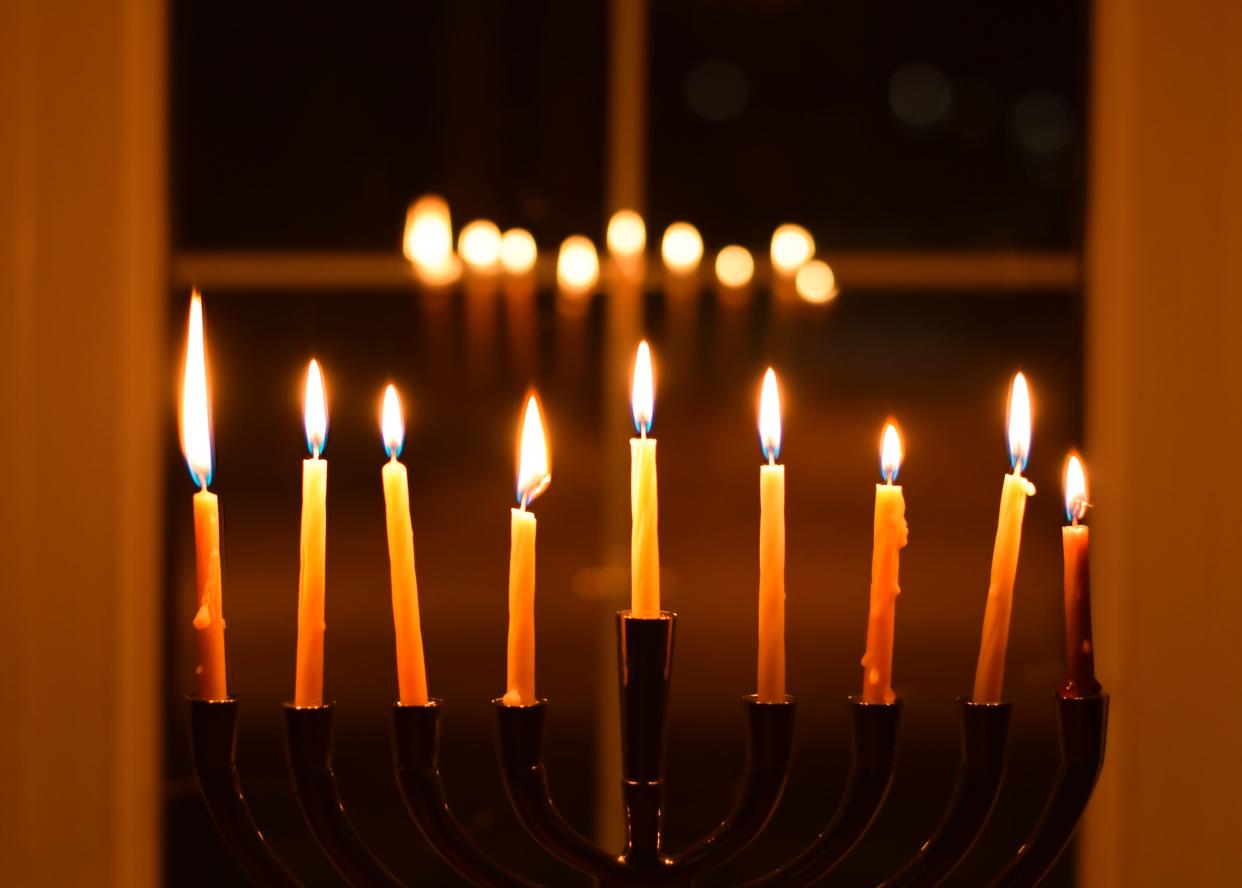Menorahs mean more this Hanukkah amid rising antisemitism: 'The fear is real'
People drive through sleepy, suburban neighborhoods during the holiday season to catch glimpses of glowing Christmas lights. But some houses host a smaller, simpler set of lights in their window: a menorah.
This special candelabra serves as a symbol of light and peace for Jews during Hanukkah, and a reminder of Jewish survival against incredible odds.
This year, those odds may feel particularly pronounced.
The ADL counted 2,717 antisemitic incidents in the U.S. last year – an all-time high and a 34% increase from the previous year. Not to mention Kanye “Ye” West and Kyrie Irving’s high-profile antisemitic rhetoric dominating the news cycle.
“If we don’t address it now, we know the path that antisemitism could take, and it won’t be good for Jews, but it won’t be good for anybody,” says Adam Neufeld, the Anti-Defamation League’s vice president of innovation and strategy.
Putting menorahs in windows is a sign of strength amid strife, Jewish community leaders say, but some Jews are afraid to put up menorahs as antisemitism increases in the U.S.
Hanukkah 2022 information: When is the first night of Hanukkah? 2022 dates for Jewish holiday, how it is celebrated.
Important: Evan Rachel Wood, Marilyn Manson and why her antisemitism allegations matter
Thousands of menorahs in Billings, Montana
Jews light the menorah during Hanukkah to remember the miraculous triumph of the Maccabee in ancient times, lighting one candle each night for eight nights. Classical Jewish texts recommend placing menorahs in windows of homes to publicize the celebration of a miracle.
“In that way, in a sense, the light will be spread,” says Rabbi Rick Jacobs, president of the Union for Reform Judaism. “The light of understanding, the light of tolerance, the light of Jewish identity, all of those.”
But will a menorah in a window really make a difference in the fight against antisemitism?
It can – and has.
Look no further than the town of Billings, Montana, whose citizens fought back in 1993 after someone launched a brick through the window of then 5-year-old Isaac Schnitzer’s bedroom. A menorah in the window sparked the attack, according to The New York Times. The Billings Gazette published a menorah drawing in response, and thousands hung these makeshift menorahs on their windows. Jews and non-Jews alike.
The Billings Gazette is recreating the full-page menorah ad this year and will ask the community to repeat history and place them in their windows. The move comes after swastikas and threatening messages recently appeared at a local high school.
“It’s important to mark this anniversary because we don’t ever want to forget the power of love,” Cole says. “Common decency is more powerful than hate.”
Billings is working with with Shine A Light, a coalition of organizations raising awareness about antisemitism. In addition to engaging several local communities like Billings, the group has partnered with corporations like Google, iHeart Media and Airbnb.
Sigh: Kanye West, Twitter and how to disengage from hate on social media
https://youtube.com/watch?v=UPGCuOMWB5c%3Ffeature%3Doembed
Hmm: Should only Jewish actresses play Jewish roles? Some say Hollywood has a ‘Jewface’ problem.
All this begs the question, about 30 years later, “what’s the wider community able to do to make Jewish families and the Jewish community feel more secure, at a very insecure moment?” asks Jacobs.
Menorahs in public spaces this time of year suggests solidarity.
“It’s a statement against antisemitism broadly given what has been happening,” Neufeld says. “It’s a sign of allyship to Jews, that they are not alone, and that these attacks affect everyone. It’s also a deep recognition that antisemitism doesn’t just affect Jews, but affects everybody, that it is part of the conspiratorial glue, that is key to so much of hate in society today.”
What Jews should do if they’re afraid to put up a menorah
While setting a menorah in a window is recommended, Jewish law also states that in times of danger, it is enough to put menorah inside on one’s table, not publicly on the windowsill. Jews must decide on their own whether they feel safe enough.
“Even in a place like New York City, where I reside, it’s certainly a place of dense Jewish community, there’s just a feeling this year; we are all nervous,” Jacobs says. He wouldn’t want anyone to feel they were somehow less authentically observant by not placing a menorah in their window. “That is a legitimate choice,” he adds. “And the fear is real.”
In case you missed: 2021 saw highest-ever number of incidents targeting Jewish Americans: Report
Antisemitism will only increase without intervention at each level of society, Neufeld says. “What is great about the menorah, and the time of year we’re in is that you don’t need to go down and lobby for a bill this month,” he adds. “It’s great if you do but you can just put a menorah up, you can speak out among your friends, you can teach about antisemitism at the workplace, and you can start to turn this tide. If we all do that, I feel confident that we can put a real dent in this.”
And don’t forget that antisemitism begets other forms of hate too.
“We see the statistics of the rise in antisemitic acts, and it is a very, very serious challenge. I would also say it’s a challenge for the wider community because antisemitism is, in some ways, the canary in the coal mine.”
Whatever the case, this Hanukkah, reflect on more than the candle lights staring back at you.
As Jacobs says: “We should also take this moment to think about Jewish history and the moments where we had been incredibly not just vulnerable but attacked and (fighting) for our very lives.”
Did you see? Paging Elon Musk: Poll shows Americans back Twitter safeguards amid worry over hate speech
This article originally appeared on USA TODAY: Hanukkah 2022: Menorahs mean more amid rising antisemitism
Source: Read Full Article
